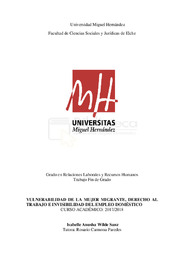Please use this identifier to cite or link to this item:
https://hdl.handle.net/11000/7244Vulnerabilidad de la mujer migrante, derecho al trabajo e invisibilidad del empleo doméstico
| Title: Vulnerabilidad de la mujer migrante, derecho al trabajo e invisibilidad del empleo doméstico |
| Authors: Wilde Sanz, Isabelle Anusha |
| Tutor: Carmona Paredes, Rosario |
| Department: Departamentos de la UMH::Ciencias Sociales y Humanas |
| Issue Date: 2018-06 |
| URI: http://hdl.handle.net/11000/7244 |
| Abstract: La realidad de la emigración y en concreto de la mujer que migra, en la mayoría de los casos por motivos económicos, y la múltiple discriminación que sufre por razón de sexo, etnia, lenguaje y acceso al mercado laboral, ha evidenciado la necesidad del estudio de este colectivo precarizado y el interés de este trabajo. Según la OIT 9 de cada 10 personas que se ocupan del trabajo doméstico son mujeres, un trabajo poco valorado y precario, con jornadas interminables y salarios bajos. Situación que se agrava en el caso de no tener su situación regularizada. Se parte de la situación de desigualdad efectiva que no normativa de la mujer en el ámbito laboral con doble discriminación en el caso de la mujer migrante. Se han utilizado para este TFG datos sobre emigración, igualdad de oportunidades y empleo doméstico del Ministerio de Igualdad. Habiéndose realizado un estudio sobre la realidad de la mujer migrante en España y detectándose una necesidad de información sobre sus posibilidades y sensibilización de sus derechos laborales. La Universidad Miguel Hernández de Elche y más concretamente la Clínica Jurídica está llevando a cabo un proyecto socioeducativo conformado por jornadas y guías formativas con la finalidad de asesorar y promover la asistencia jurídica, dando a conocer a este colectivo sus derechos, sus deberes y sobre todo que sepan que están protegidos por una legislación. El resultado ha sido muy gratificante a la vez que preocupante ya que se puso de manifiesto la explotación que estaban sufriendo las personas que habían “conseguido” trabajo, con jornadas maratonianas y sin respetar sus derechos básicos como trabajadoras. De ahí la importancia de la formación como forma de tomar conciencia. Quiero destacar que ha sido un proyecto en el que me ha sido muy grato participar como voluntaria y agradecer especialmente a mi tutora Dña. Rosario Carmona Paredes, ya que sin su ayuda, gran apoyo y dedicación no hubiese tenido la gran satisfacción y oportunidad de realizar. The reality of emigration, and in particular of women who migrate, in most cases for economic reasons, and the multiple discrimination caused by gender, ethnicity, language and access to the labour market, has evidenced the need of the study of precarious group and the interest of this work. According to the ILO, 9 out of 10 people who are responsible from domestic work are women, a poorly valued with precarious work, with endlessworking days and low wages. The life conditions become worse in the case of not having the situation of residence legally regulated. It is a situation of effective inequality that is not normative for women in the workplace with double discrimination in the case of migrant women. For this TFG, data on emigration, equal opportunities and domestic employment have been used by the Ministry of Equality. Having carried out a study on the reality of migrant women in Spain and detecting a need for information about their possibilities and awareness of their labour rights. The Miguel Hernandez University of Elche and more specifically the “Clínica Jurídica” is conducting a socio-educational project conformed of seminars and training guides in order to advise and promote legal assistance, making known to this group their rights, their duties and above all that they know they are protected by legislation. The result has been very rewarding as well as worrisome sine it showed the exploitation that people who has “got” work were suffering, with an exhausting and endless work days and without respecting their basic rights as workers. Therefore the importance of training a way of becoming aware. I would like to point out that it has been a project in which I have been very pleased to participate as a volunteer and I especially thank my tutor Mrs. Rosario Carmona Paredes, without whose great support and dedication I would not have had the great satisfaction and opportunity to participate. |
| Keywords/Subjects: trabajo domestico domestic work mujer emigrante doble discriminación migrant women double discrimination |
| Knowledge area: CDU: Ciencias sociales: Economía: Trabajo. Relaciones laborales. Ocupación. Organización del trabajo |
| Type of document: info:eu-repo/semantics/bachelorThesis |
| Access rights: info:eu-repo/semantics/openAccess |
| Appears in Collections: TFG - Relaciones Laborales y Recursos Humanos |
.png)

